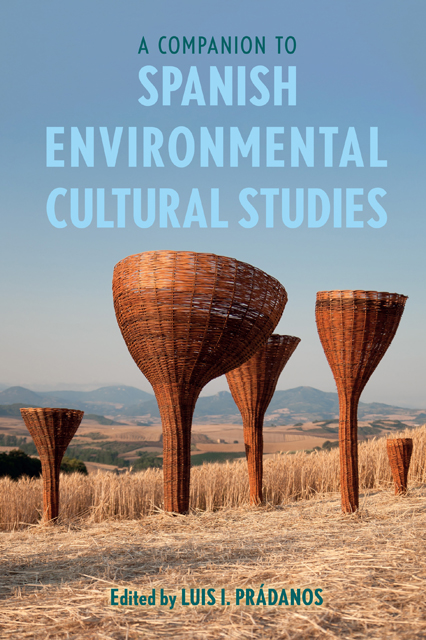Book contents
- Frontmatter
- Contents
- List of Illustrations
- List of Contributors
- Note on the Translations
- Acknowledgements
- Introduction: Spanish Environmental Cultural Studies
- Part I Environmental Cultural History and Political Ecology
- Part II Water and Power
- Part III Ecologies of Memory and Extractivism
- Part IV Animal Studies and Multispecies Ethnographies
- Part V Food Studies and Exploitative Ecologies
- Part VI Ecofeminism
- Part VII (Neo)Colonial and Racialized Ecologies
- Part VIII Tourism and the Environmental Imagination
- Part IX Eco-Mediation and Representation
- Part X Trash and Discard Studies
- Bibliography
- Index
11 - Ready-to-Hand: The Withdrawal of Animal Life in Francoist Cultural Production
Published online by Cambridge University Press: 08 June 2023
- Frontmatter
- Contents
- List of Illustrations
- List of Contributors
- Note on the Translations
- Acknowledgements
- Introduction: Spanish Environmental Cultural Studies
- Part I Environmental Cultural History and Political Ecology
- Part II Water and Power
- Part III Ecologies of Memory and Extractivism
- Part IV Animal Studies and Multispecies Ethnographies
- Part V Food Studies and Exploitative Ecologies
- Part VI Ecofeminism
- Part VII (Neo)Colonial and Racialized Ecologies
- Part VIII Tourism and the Environmental Imagination
- Part IX Eco-Mediation and Representation
- Part X Trash and Discard Studies
- Bibliography
- Index
Summary
As the non-human turn gathered speed over the first two decades of the twenty-first century, critics of Iberian cultural production increasingly granted higher consideration to non-human species and inanimate objects as variously deserving of agency, rights, and analytical attention. Carrying out an eco-critical or post-humanist analysis can be more straightforward in cultural texts from the recent past, as contemporary authors and directors of novels, film, and other media are ensconced in the throes of myriad ecological crises and thus often create ample stages in their works for critique of the anthropocentric biases at the heart of concepts such as nature, culture, and conservation. However, the non-human turn also illuminates, retroactively, overlooked aspects of foundational texts and films from earlier in the Anthropocene, before it was referred to as such, to which scholars in Iberian Studies already have provided ample insight. In this chapter, I will focus specifically on the presence of the animal in texts produced during the Francoist dictatorship, as these works emphasize how modern systems of philosophical, cultural, and scientific understanding articulated the place of the human in relation to the lives of other species and inanimate objects. I will focus especially on the figure of the pigeon-dove in Mercè Rodoreda’s 1962 novel La plaça del diamant (The Time of the Doves). Animal life, even when relegated to symbolic practice, is central to the story of Iberian cultural production in the twentieth century.
The cultural status of animals and their symbolic weight in cultural production are of critical importance to some of the most celebrated novelists, poets, playwrights, and film directors of twentieth-century Spain. In numerous cases, animal life was mobilized during the dictatorship of Francisco Franco between 1939 and 1975 as part of intricate symbolic systems that attempted to critique Spanish society and politics while evading the Regime’s repressive crosshairs. The bull, perhaps the symbolic animal par excellence in Spain from the moment the Ancient Greek writer Strabo describes the Iberian peninsula as a stretched-out bull’s hide, was a frequent target. Luis Martín-Santos and Juan Goytisolo, prominent novelists who navigated the authoritarian structures of the Francoist Regime while nevertheless expanding the representational possibilities and thematic depths of the Spanish novel, criticized bullfighting in their literature and public writings as conceptually tied to masculinity, political violence, and anti-liberalism.
- Type
- Chapter
- Information
- A Companion to Spanish Environmental Cultural Studies , pp. 125 - 132Publisher: Boydell & BrewerPrint publication year: 2023



